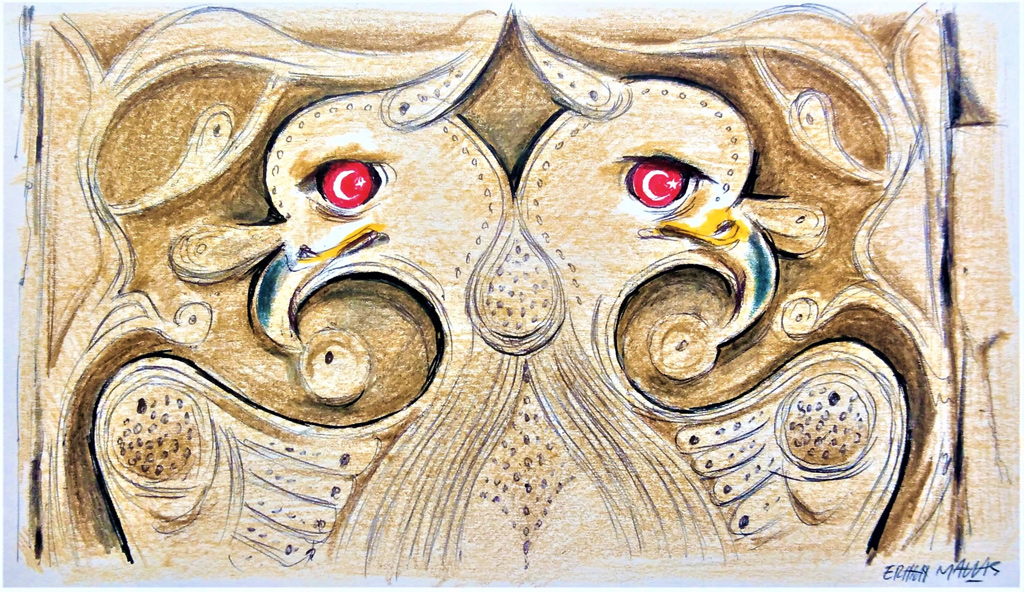
5 messages to the confused minds on Türkiye
Erdoğan gave a speech on five key messages on the top items on Türkiye’s foreign policy agenda to clear up people’s confusion
Share
President Recep Tayyip Erdoğan yesterday addressed the 13th Ambassadors Conference, of which the main theme was “Wise and compassionate Turkish diplomacy on the eve of 2023 and beyond” and delivered key messages on the top items on Türkiye’s foreign policy agenda.
The news stories about some Western governments’ unhappiness with the Sochi summit, which took place on Aug. 5, and Türkiye’s deepening economic cooperation with Russia certainly added to the significance of those remarks.
Specifically, Erdoğan’s pledge to “create a 30-kilometer-deep safe zone” in Syria and “connect the various links of the security corridor soon” hinted that he has not reversed his decision to carry out a military operation across Türkiye's southern border.
At the same time, the Turkish president identified Al-Aqsa Mosque as a red line for his country and criticized Israel’s attacks against Gaza, highlighting the limits of the normalization policy.
It is possible to identify the most important parts of Erdoğan’s address as follows:
First, he highlighted his contributions to the core principle of the Republic’s foreign policy: “Peace at home, peace in the world.” Stressing that Türkiye aimed to “create an area of peace and cooperation” and “promote good neighborly relations” in its neighborhood, Erdoğan made references to the grain deal and the 2020 victory in Karabakh to underline that “the principle of ‘peace at home, peace in the world’ can only become reality with a proactive approach,” as “the difficulty of accomplishing things at the negotiating table without being strong on the ground is self-evident.”
Secondly, President Erdoğan identified the Russia-Ukraine war as a reflection of the international system’s inadequacy. Recalling his well-known mottos, “the world is bigger than five” and “a fairer world is possible,” he reiterated his call for creating a new system “centered around humans, justice, fairness, rights and equality.” It should not be surprising for the Turkish leader to argue at the United Nations General Assembly next month that the Russia-Ukraine war deepened the international system’s long-standing crisis and call for U.N. reform much more forcefully. Obviously, Erdoğan happens to be in a position to send such striking messages to world leaders, as his diplomatic success made the grain deal possible and he still insists on bringing together Russia’s President Vladimir Putin and Ukrainian President Volodymyr Zelenskyy.
Erdoğan’s third point was to remind the critics of Türkiye’s rapprochement with Russia after last week’s Sochi summit of what his country’s strategic position requires. Accordingly, he insisted that Ankara could not turn its back on the East or the West, given its geographical location: “Much like the double-headed eagle, the symbol of the Great Seljuk state, we ought to keep strong our relations with the East and the West simultaneously.” In this sense, Erdoğan does not think that developing his country’s relationship with Russia hurts the Western alliance’s interests. Quite the contrary, he wants to strengthen Türkiye’s position within the Western alliance and consolidate its relationships with all other global powers, including Russia. Erdoğan's message would make more sense if the reader were to recall how the relationship between the two countries has been defined by competition and cooperation in Syria, Libya and Karabakh.
The fourth point was that making Türkiye’s relationship with the United States “compatible with the changing regional and global dynamics” was a question of shared interests and that Ankara had not given up on joining the European Union. However, Erdoğan did not refrain from bringing up Washington’s support for FETÖ and the PKK/YPG or the EU’s double standards. It is no secret that Türkiye is unhappy with the American and European idea of “alliance” when it comes to their relations with Ankara. Instead, it demands a new kind of relationship rooted in equality and fairness and complains about its security interests being neglected by its allies. Yet, Türkiye does not raise those issues in talks with the relevant countries. At the same time, it prioritizes diplomacy to build that new relationship and risks certain tensions and criticism if necessary. It would be a mistake for Western governments to treat Türkiye’s policy toward Russia from the traditional "bloc policy" perspective. At the end of the day, Türkiye needs to address the various problems that emanate from its neighborhood, just as it must seize the opportunities that its location entails.
Last but not least, my fifth takeaway from Erdoğan’s address to the 13th Ambassadors Conference was that he cares about strengthening Türkiye’s position in the international arena against the backdrop of intensifying great power competition. That is the only way for our country to keep a lid on the various problems and crises in its neighborhood and to contribute to global peace and stability.
[Daily Sabah, August 10, 2022]
Tags »
Related Articles






